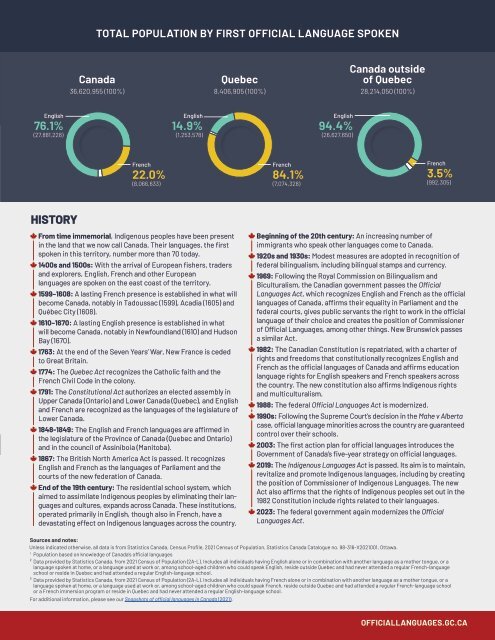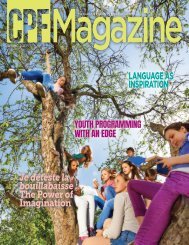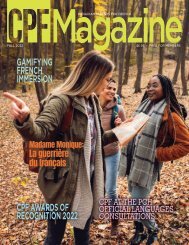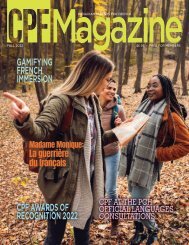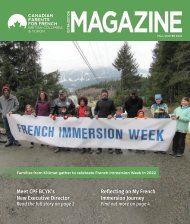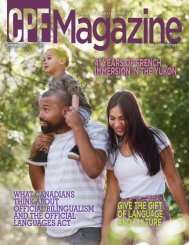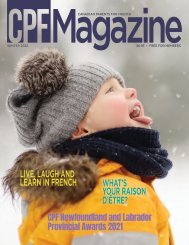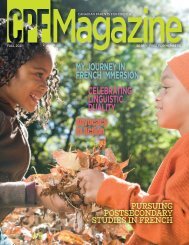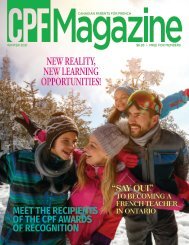CPF Magazine Fall 2023
A national network of volunteers, parents and stakeholders who value French as an integral part of Canada. CPF Magazine is dedicated to the promotion and creation of French-second-language learning opportunities for young Canadians.
A national network of volunteers, parents and stakeholders who value French as an integral part of Canada. CPF Magazine is dedicated to the promotion and creation of French-second-language learning opportunities for young Canadians.
- No tags were found...
You also want an ePaper? Increase the reach of your titles
YUMPU automatically turns print PDFs into web optimized ePapers that Google loves.
TOTAL POPULATION BY FIRST OFFICIAL LANGUAGE SPOKEN<br />
Canada<br />
36,620,955 (100%)<br />
Quebec<br />
8,406,905 (100%)<br />
Canada outside<br />
of Quebec<br />
28,214,050 (100%)<br />
English<br />
76.1%<br />
(27,881,228)<br />
English<br />
14.9%<br />
(1,253,578)<br />
English<br />
94.4%<br />
(26,627,650)<br />
French<br />
22.0%<br />
(8,066,633)<br />
French<br />
84.1%<br />
(7,074,328)<br />
French<br />
3.5%<br />
(992,305)<br />
HISTORY<br />
From time immemorial, Indigenous peoples have been present<br />
in the land that we now call Canada. Their languages, the first<br />
spoken in this territory, number more than 70 today.<br />
1400s and 1500s: With the arrival of European fishers, traders<br />
and explorers, English, French and other European<br />
languages are spoken on the east coast of the territory.<br />
1599–1608: A lasting French presence is established in what will<br />
become Canada, notably in Tadoussac (1599), Acadia (1605) and<br />
Québec City (1608).<br />
1610–1670: A lasting English presence is established in what<br />
will become Canada, notably in Newfoundland (1610) and Hudson<br />
Bay (1670).<br />
1763: At the end of the Seven Years’ War, New France is ceded<br />
to Great Britain.<br />
1774: The Quebec Act recognizes the Catholic faith and the<br />
French Civil Code in the colony.<br />
1791: The Constitutional Act authorizes an elected assembly in<br />
Upper Canada (Ontario) and Lower Canada (Quebec), and English<br />
and French are recognized as the languages of the legislature of<br />
Lower Canada.<br />
1848-1849: The English and French languages are affirmed in<br />
the legislature of the Province of Canada (Quebec and Ontario)<br />
and in the council of Assiniboia (Manitoba).<br />
1867: The British North America Act is passed. It recognizes<br />
English and French as the languages of Parliament and the<br />
courts of the new federation of Canada.<br />
End of the 19th century: The residential school system, which<br />
aimed to assimilate Indigenous peoples by eliminating their languages<br />
and cultures, expands across Canada. These institutions,<br />
operated primarily in English, though also in French, have a<br />
devastating effect on Indigenous languages across the country.<br />
Beginning of the 20th century: An increasing number of<br />
immigrants who speak other languages come to Canada.<br />
1920s and 1930s: Modest measures are adopted in recognition of<br />
federal bilingualism, including bilingual stamps and currency.<br />
1969: Following the Royal Commission on Bilingualism and<br />
Biculturalism, the Canadian government passes the Official<br />
Languages Act, which recognizes English and French as the official<br />
languages of Canada, affirms their equality in Parliament and the<br />
federal courts, gives public servants the right to work in the official<br />
language of their choice and creates the position of Commissioner<br />
of Official Languages, among other things. New Brunswick passes<br />
a similar Act.<br />
1982: The Canadian Constitution is repatriated, with a charter of<br />
rights and freedoms that constitutionally recognizes English and<br />
French as the official languages of Canada and affirms education<br />
language rights for English speakers and French speakers across<br />
the country. The new constitution also affirms Indigenous rights<br />
and multiculturalism.<br />
1988: The federal Official Languages Act is modernized.<br />
1990s: Following the Supreme Court’s decision in the Mahe v Alberta<br />
case, official language minorities across the country are guaranteed<br />
control over their schools.<br />
2003: The first action plan for official languages introduces the<br />
Government of Canada’s five-year strategy on official languages.<br />
2019: The Indigenous Languages Act is passed. Its aim is to maintain,<br />
revitalize and promote Indigenous languages, including by creating<br />
the position of Commissioner of Indigenous Languages. The new<br />
Act also affirms that the rights of Indigenous peoples set out in the<br />
1982 Constitution include rights related to their languages.<br />
<strong>2023</strong>: The federal government again modernizes the Official<br />
Languages Act.<br />
Sources and notes:<br />
Unless indicated otherwise, all data is from Statistics Canada, Census Profile, 2021 Census of Population, Statistics Canada Catalogue no. 98-316-X2021001, Ottawa.<br />
1<br />
Population based on knowledge of Canada’s official languages<br />
² Data provided by Statistics Canada, from 2021 Census of Population (2A-L). Includes all individuals having English alone or in combination with another language as a mother tongue, or a<br />
language spoken at home, or a language used at work or, among school-aged children who could speak English, reside outside Quebec and had never attended a regular French-language<br />
school or reside in Quebec and had attended a regular English-language school.<br />
³ Data provided by Statistics Canada, from 2021 Census of Population (2A-L). Includes all individuals having French alone or in combination with another language as a mother tongue, or a<br />
language spoken at home, or a language used at work or, among school-aged children who could speak French, reside outside Quebec and had attended a regular French-language school<br />
or a French immersion program or reside in Quebec and had never attended a regular English-language school.<br />
For additional information, please see our Snapshots of official languages in Canada (2021).<br />
OFFICIALLANGUAGES.GC.CA


